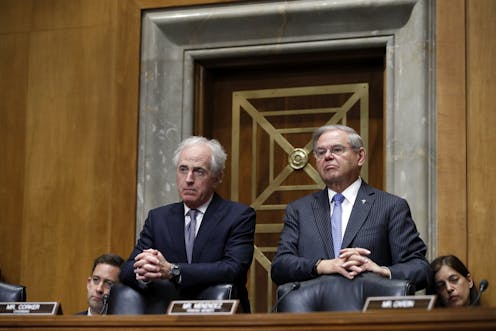Senate confirmation: The grilling can be grueling
Senate confirmation for many of President Trump's nominees has been tough. In this speed read, The Conversation asks: What is Senate confirmation, and why do we do it?

President Donald Trump’s nominees to head the State Department, Veterans Affairs and the CIA are facing confirmation battles in the Senate.
Behind those battles lies the power of the president to nominate and the Senate to confirm candidates for more than 2,000 positions – including ambassadors, federal judges and Cabinet secretaries.
The Senate’s confirmation role is a fundamental governmental function, embedded into the U.S. Constitution Article II, Section 2, that preserves the balance of power between the executive and legislative branches. Its job of “advice and consent” on presidential nominees aims to limit to the power of any one person or branch of government.
Some nominees face significant scrutiny from U.S. senators who customarily grill prospective government officials in open committee hearings. The committee then votes whether or not to advance the nomination to a full Senate vote, though it may also not vote at all on a controversial nominee.
Almost all nominees survive the confirmation process. Just a handful are forced to withdraw from consideration or come up short when put to a vote. According to the Congressional Research Service, 99 percent of nominees are approved.
Rejected by the Senate
But there have been exceptions. In 1987, Ronald Reagan famously nominated Robert Bork to the U.S. Supreme Court.
Bork’s controversial conservative views on a number of legal matters, including privacy and civil rights, drew criticism from a number of senators who relentlessly questioned Bork. His nomination was defeated by the U.S. Senate 58 to 42.
While some are rejected by the Senate based on their policy positions, others fail to gain Senate support due to personal scandal.
George H.W. Bush’s pick for secretary of Defense, John Tower, faced questions about excessive drinking and alleged philandering in 1989. Tower, a former U.S. senator from Texas, could not get enough votes from his former colleagues to be confirmed.
Forced to withdraw
Some nominees choose to withdraw from consideration.
Bill Clinton’s nominee for attorney general, Zoe Baird, dropped out after reports that she had not paid taxes on wages for her domestic help. Former U.S. Sen. Tom Daschle, President Obama’s original pick for Health and Human Services secretary, also withdrew his name from consideration due to tax problems.
But not every grilling is meant to derail a nomination.
As part of their role, senators may ask hard questions in order to get the nominee on the record about his or her positions that may not yet be public. That way, they can hold the nominee accountable once they’ve been confirmed.
Capri Cafaro is affiliated with the Democratic Party both as a registered voter and a former elected official in Ohio.
Read These Next
Drug company ads are easy to blame for misleading patients and raising costs, but research shows the
Officials and policymakers say direct-to-consumer drug advertising encourages patients to seek treatments…
AI’s growing appetite for power is putting Pennsylvania’s aging electricity grid to the test
As AI data centers are added to Pennsylvania’s existing infrastructure, they bring the promise of…
Why US third parties perform best in the Northeast
Many Americans are unhappy with the two major parties but seldom support alternatives. New England is…





